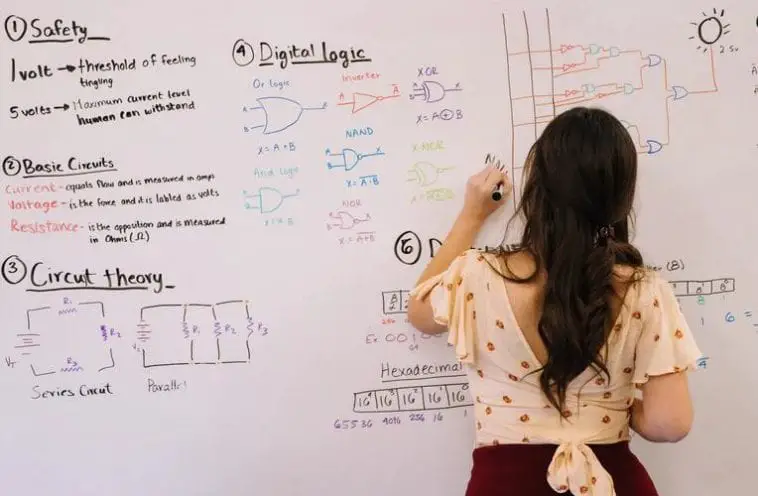


When you’re busy cramming for your finals, your biggest sources of support and guidance are likely to be your professors and teaching assistants (TAs). There will be many times you’ll have to ask for their help across the years of your education.
But you must also be mindful of the fact that your professors and TAs supervise a lot of students. Besides their regular responsibilities that include teaching classes and grading papers, they’re likely to be receiving and responding to email from many students like you.
Keeping this in mind, you should make as much effort as possible to meet them halfway and respect their time. Make your request as clear and actionable as possible to maximize your chances of getting the support you need. If your request isn’t understandable or clear, your TA may not be able to help you even if they want to.
Many of us don’t know how to address a TA in an email. Read on to find our top tips below, as well as some sample email drafts you can customize to suit your needs.

Here are some of our top tips on how to address a TA in an email:
If you’ve been given an official university email address, use this account to write to your TA. This helps them quickly identify you as a student of the university and validate that the email is in fact from you. Busy TAs may not even open email that doesn’t come from a verified university email account.
Your relationship with your TA is a professional one. Unless you are invited to drop formal terms of address and tone, don’t speak to your TA using informal language.
Use the same care in writing your email as you would in writing a letter. Write in full sentences. Don’t use text message language (abbreviations such as “BTW”, “TBH”, “thx”, “c u”, etc). Also don’t use ellipses (…) instead of appropriate punctuation. This may be appropriate for use among friends, but not in a professional setting.
Use proper capitalization. Don’t type in all capital letters as this can come across as very aggressive to the reader. Also don’t use all small letters, as it can seem unprofessional and lazy.
Emojis can be useful in indicating tone where something might be confusing, but avoid using them unnecessarily in formal communication.
Emails that don’t use a salutation can appear unprofessional. Jumping straight into describing your request is something you can do when you’re writing to your friends, but you shouldn’t do this with a professor or TA.
Don’t begin your email with “Dear TA”. You can use “Dear Mr. [Last Name]”. If you are on first name terms, you can use “Dear [First Name]”. You can also simply begin your email with “Dear sir” or “Dear ma’am” as appropriate.
Conclude your email with a formal sign off like “Sincerely,” or “Regards,” followed by your full name (to avoid confusion) in the following line.
In long email threads, it may be acceptable to drop this in the interests of time, but do sign off properly as a rule.
Don’t leave the subject field blank. Instead, include your course title (e.g. ENG 101) and a few words that summarize your request. A good template to use is:
[Course Title] Query Regarding [Topic]
Blank subject lines can look spammy, and don’t give the reader any useful information. A well written subject line conveys your request succinctly to the reader, making it easier for them to act on it.
Avoid using subject lines like “Urgent request” and “Immediate reply needed”. Demands like this can be off-putting, and aren’t the best way to get the help you need.
Like most educators, TAs are often overworked and underpaid. They probably receive 30-40 emails per day from students like you, and need to spend a considerable amount of time responding to them all.
One way that you can help them is by making their job as simple as possible.
What does this mean? Be courteous and respectful. Keep your email short, no longer than 2-3 short paragraphs. And take the time to properly organize everything you say. Treat writing your email like writing an essay and structure it effectively.
Begin by mentioning your name, class and year so that they can quickly place you. Only then should you mention your request, in a new paragraph.
Using a proper structure will make it easier for the reader to understand and process your request.
Some other considerations can make it easier for you to communicate with your TA in an email are:
Maybe the answer to your query already exists on the college website, course syllabus, a previous announcement or other documentation. Make sure you check all available sources first. Only ask your TA for help if you can’t find it anywhere else. This ensures you’re not wasting their time.
Make sure you understand what your TA’s responsibilities are. They may be involved in grading assignments, teaching classes, administering tests, etc, and it may be inappropriate for you to ask them to offer help that doesn’t fall within their role. Be sure to properly understand what it is they can and cannot help you with.
Set context and ask a specific question. It’s probably not helpful for your TA if you say you don’t understand a topic or a text. Instead, try to articulate your confusion and state which part you’re having trouble with. Distil your query down to a specific question. This would help your TA respond quickly and effectively, getting you the information you need.
Use email only for quick queries. Most people don’t want to spend hours reading email or writing back. If you feel addressing your query will require a long back and forth exchange or a complex explanation, avoid asking for this over email. An alternative could be to set up a meeting within the TA’s office hours.

Below are some examples of how to address a TA in your email:
Email is best for quick queries that can be answered in 1-2 lines, such as requesting clarifications regarding an essay, assigned reading, etc.
SUBJECT: STAT 109 – Question Regarding Source Material For Essay
My name is Daphne, and I’m a student in the Statistics 109 class that you’ve been teaching.
I had a question about the essay on “Statistical Errors” that’s due on Wednesday. Are we expected to construct our essays using only the study material that’s part of the syllabus? Can we include references to other relevant material such as books and articles on the subject that we’ve come across as part of our research?
Looking forward to hearing from you.
Daphne Lilja Iordanou
Statistics, Class of 2023
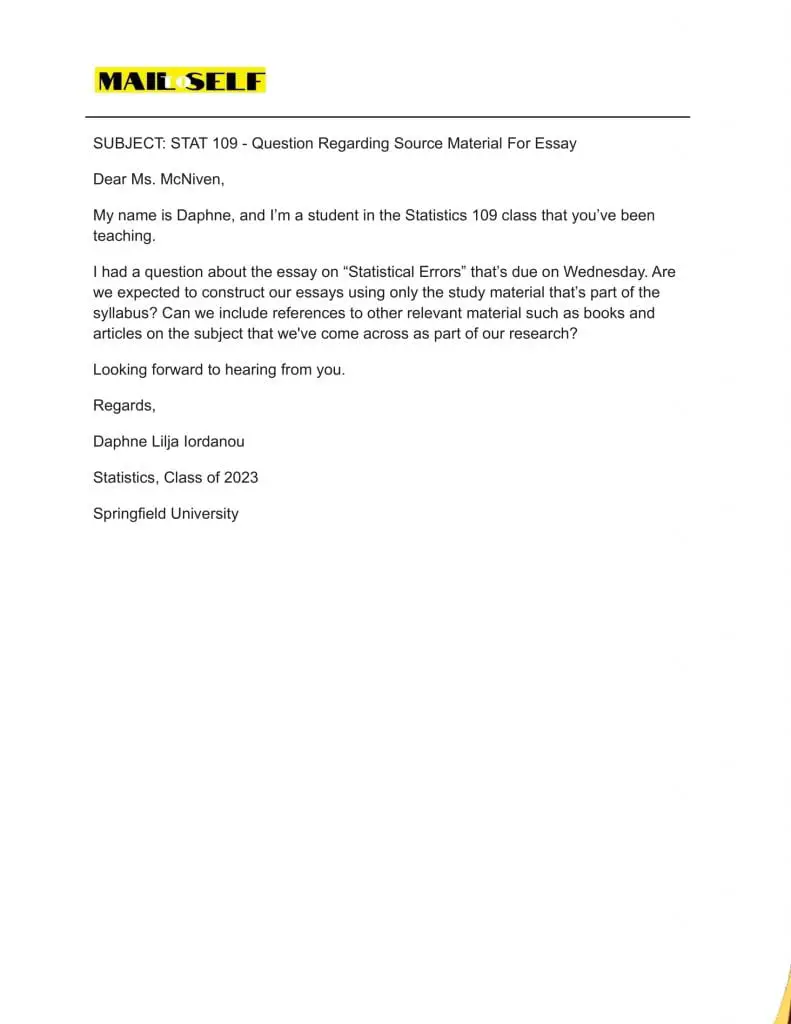
In case you’re anticipating that you’re going to miss a deadline, you could write to your TA to ask for an extension.
SUBJECT: Bioinformatics 213 – Extension Request for Assignment
I’m Luzia, a student in the Bioinformatics 213 class.
Our assignments on pathogen profiling are due at the end of the week. However, I’ve had a difficult week so far with my mother falling ill and needing to be hospitalized. I wanted to request an extension.
The doctors tell us that my mother should be discharged by the end of the week. Considering this and the amount of work I’ve already done on my assignment, I’m confident I could turn it in by next Tuesday. Would that be acceptable?
Luzia Fane Eaton
Bioinformatics, Class of 2024
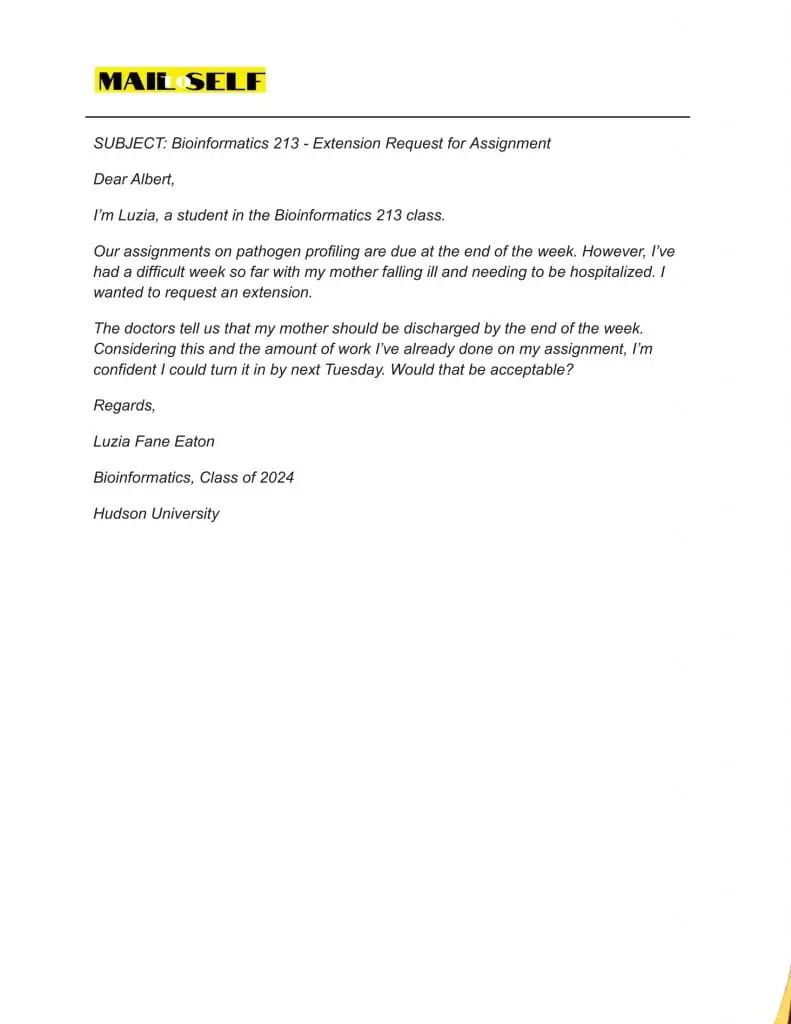
Your TA may be able to help review your work and share feedback. But it’s probably better to meet them in person for such a discussion rather than asking them to share their input over email.
SUBJECT: MedChem 112 – Feedback Request For My Essay
Dear Ms. Gunnarsen,
I hope this email finds you well.
My name is Glenda, and I’m a student in the MedChem 112 class. Professor Pasternak suggested that I speak with you.
I’ve been working on my essay on the formation of globular proteins. I know you’ve done a lot of work on this topic. If it’s not too much trouble, I wanted to ask if you could review it once before I make my final revisions.
I’m attaching the draft here. I could drop by during your office hours on Monday so we can have a longer chat. Do let me know if you’d prefer another time to meet.
Glenda Alojzija Gonzales
Medicinal Chemistry, Class of 2024
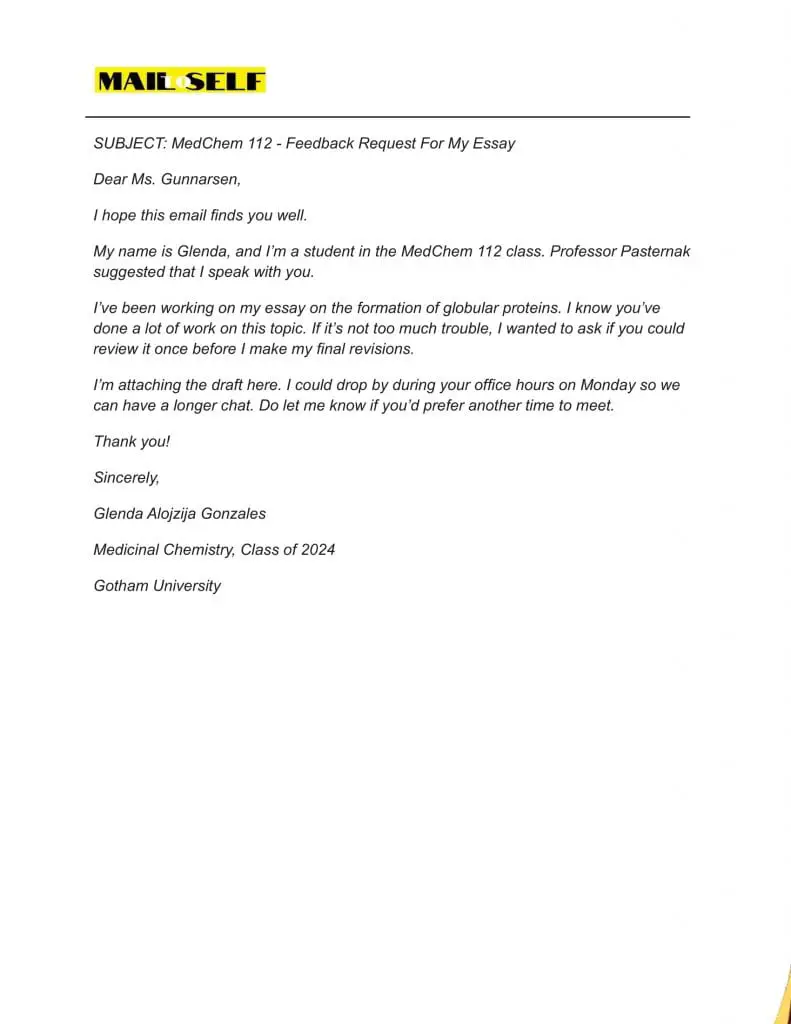
You might need to write your TA to ask about any course materials that are not available in the designated places.
SUBJECT: OPT ENGG – Question Regarding Study Guide
I’m Candace, and I’m enrolled in the Optical Engineering course.
I was having some trouble locating the study guide for the course. I was under the impression that this would already be available on the website or discussion forums, but I’m unable to find it there. Could you please point me in the right direction?
I look forward to your reply.
Optical Engineering, Class of 2023
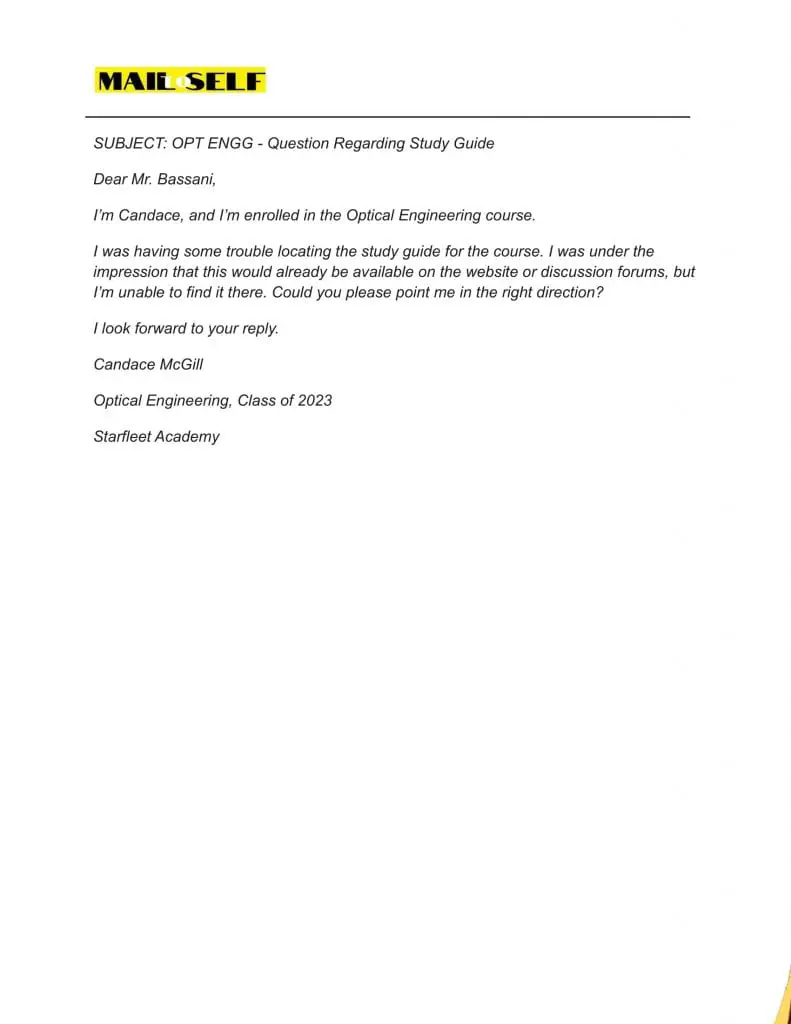
In case you’d like to have a longer conversation with your TA, it’s probably best to request an in-person meeting rather than initiating an email discussion.
SUBJECT: Civil Procedure – Requesting Suggestions for Improvement
Dear Mr. Eberhardt,
My name is Emil, and I’m a student in your Civil Procedure course.
While I’m greatly enjoying the course, I’m not fully satisfied with my progress. I feel there are certain topics where I could be doing better.
I’d like to meet with you to discuss how I can improve my test scores: whether I could benefit from additional tutoring, mock tests, or other measures.
I’d like to drop by during your office hours on Tuesday, if that works for you.
I look forward to hearing from you.
Civil Procedure, Class of 2022
Pendleton State University
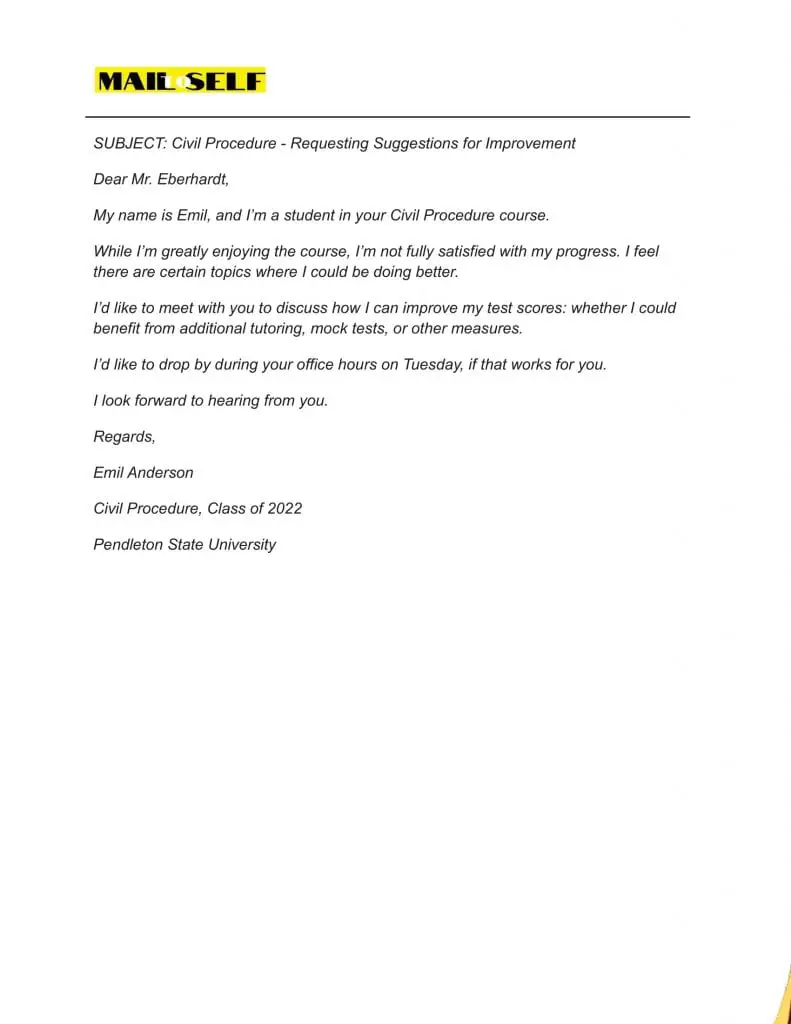
You may also want to ask your TA to go over a completed and graded exam with you, to help you understand how you can improve your answers in the future.
SUBJECT: Zoosemiotics: Follow up on the exam
I am Elvira, a student in your Zoosemiotics class.
I was a bit disappointed when I saw my grade on the latest exam. I’d studied hard for it, but I seem to be having some difficulty articulating what I’ve learned in an effective way.
I really want to do better in the finals. In order to prepare for this, I’d like to meet with you to discuss my responses (particularly on the long form questions). This would help me understand how I can frame my answers more effectively next time.
If this is agreeable to you, could I drop by during your office hours to have this discussion sometime this week?
I look forward to hearing from you.
Elvira Paul Rojo
Zoosemiotics, Class of 2026
Blue Mountain State
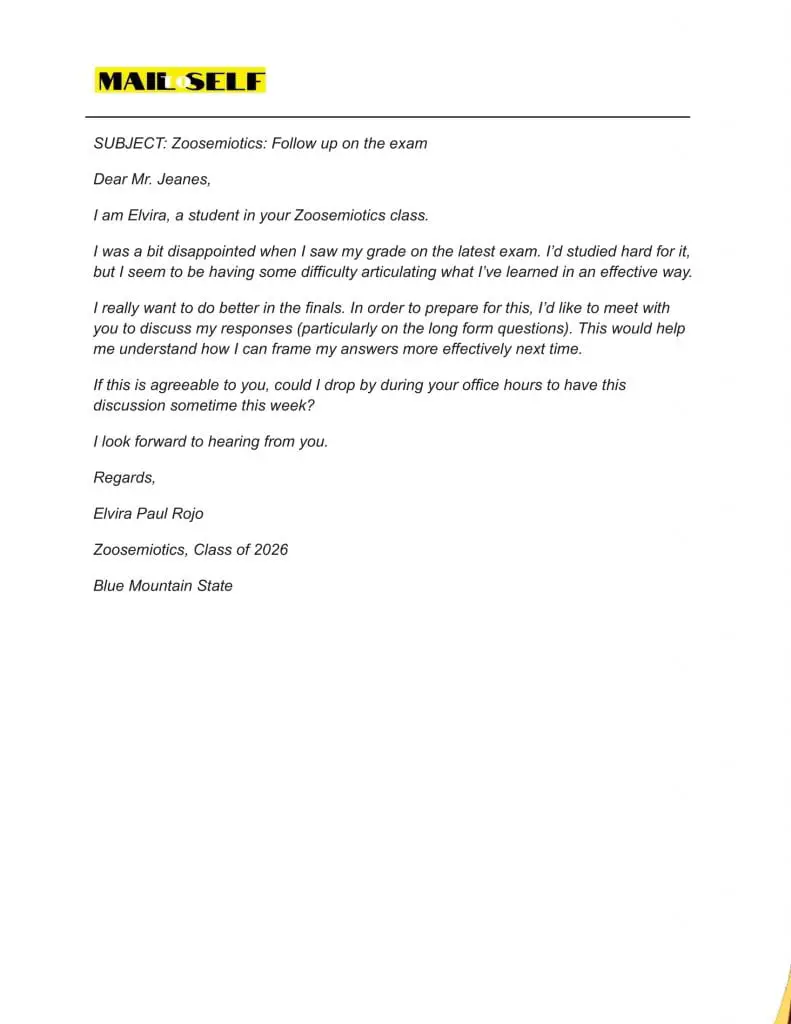
Sometimes, if your TA doesn’t respond to your email within a reasonable amount of time, you may have to send a follow up email. These can be kept relatively short and brisk.
SUBJECT: [Same as previous email]
I’m just following up on the email I’d sent you earlier this week. I had a question about [topic of previous email] and I’d really appreciate your input.
Looking forward to your reply.
English Studies, Class of 2021
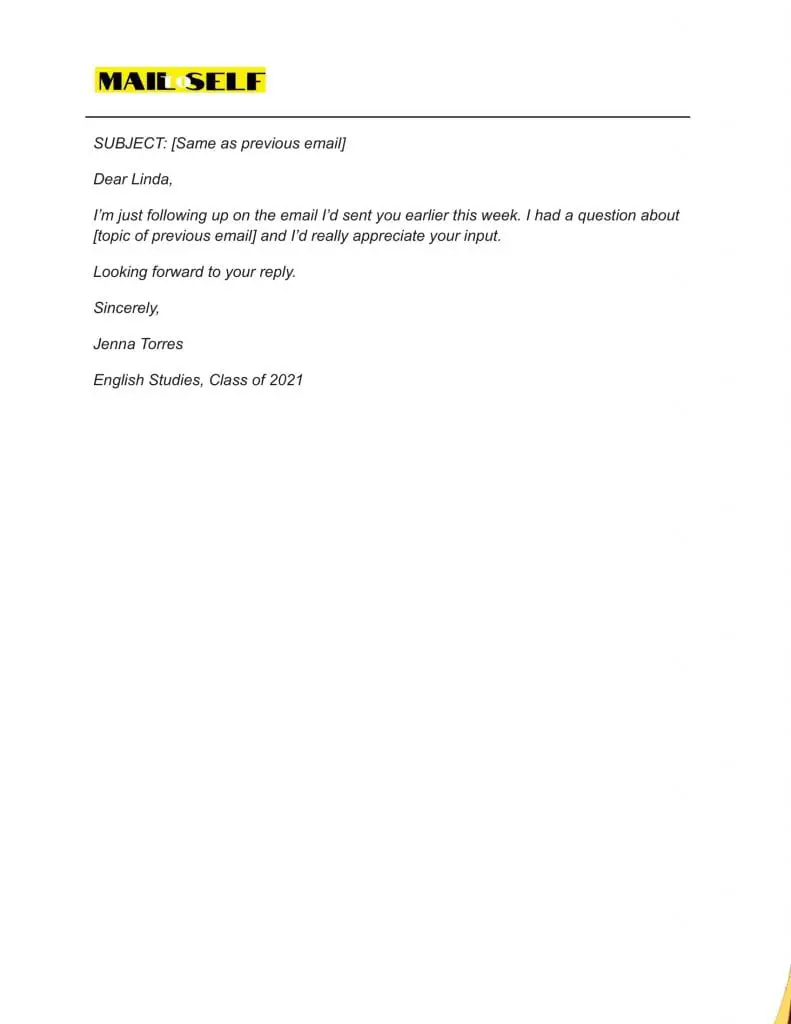
Empire State University You can tweak these email templates to suit your needs. Remember: a well written email is one that maximizes clarity and minimizes confusion. It allows your TA to quickly understand what you’re expecting from them and respond in a timely manner.











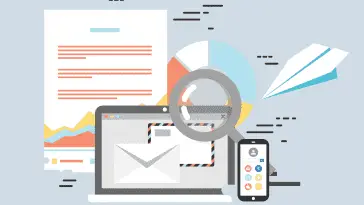








Emails, letters, and notes have become part of our everyday lives today. All kinds of professional and formal communications are exchanged using emails and letters, regardless of which field of work you belong to.